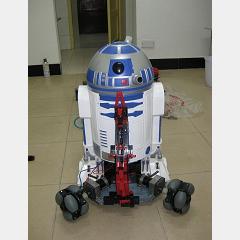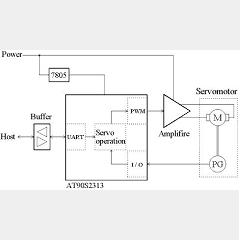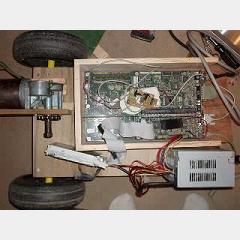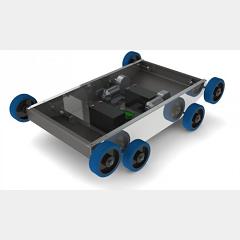Categories
- animatronics (12)
- apple (11)
- arduino (179)
- art (41)
- articles (121)
- artificial intelligence (11)
- automation (421)
- avr (205)
- bitcoin (3)
- breadboard (9)
- cameras (57)
- cars (26)
- cell phones (28)
- clothing mods (21)
- console mods (26)
- dangerous (94)
- desktop mods (24)
- embedded (5)
- flying things (54)
- fpga (22)
- gaming creations (108)
- interface (225)
- internet (17)
- laptop mods (6)
- lasers (22)
- linux (7)
- magnetic (3)
- medical (12)
- microcontrollers (51)
- misc projects (152)
- msp (12)
- music (124)
- pic (90)
- projects (23)
- pyroedu (76)
- raspberry pi (26)
- robots (312)
- security (36)
- sensors (307)
- software (200)
- solar (19)
- stamp (9)
- tools (149)
- tutorials (98)
- Uncategorized (45)
- usb (44)
- wireless (256)
Sponsors


Posted August 3, 2011 by Chris
In a creepy looking monster twist here is a parallax powered animatron that actually has a brain. Aside from being able to move, blink and talk, this animatron has built in speech recognition. Check out the demo video and full article in the pdf.

Posted August 2, 2011 by Chris
R2-D2 is a favorite to geeks everywhere and at least one of us in China has brought some life and extended features to the little droid. This project which was submitted for competition in Beijing is a combo of navigation, firefighting and automation rolled into one.

Posted July 30, 2011 by Chris
This article introduces a gigantic etch-a-sketch in the form of a triple hinged robot. To control the system, either a capacitive touch sensor is used or pre-programed drawing movements. 3 Large servos control the 3 arms of the robot and an MSP430 launchpad is used for the control system for the core I/O.

Posted July 24, 2011 by Chris
Servo motors are used everywhere in industry, commercially most people only see them in RC hobby electronics as small servo units. However you use them, it’s important to understand what is going on inside them. This article shows you how to build your own DC servo motor controller. The system uses PI feedback for correcting the position error.

Posted July 5, 2011 by Chris
This robot, while still a seemingly perpetual work in progress, is a real throw back. Started in 2002, it’s basically a desktop computer on wheels with some wicked control circuitry. The author spits out everything about the design and software used to make the robot go. It’s a fun read, but I wouldn’t entrust my life to this two wheeled robot, no offense Ralph!

Posted June 30, 2011 by Chris
This article shows how you can take some standard R/C cars, hack away at their guts and make automated racing cars. Two ultrasonic proximity sensors were added to each car so that they can sense their surroundings and a Picaxe micro was added to make the cars intelligent. Check out the action video to see autonomous racing.

Posted June 27, 2011 by Chris
Today’s article shows you the process of designing and building a rather impressive looking tank. To control the tank my own 10A H-Bridge is used along with other control circuitry. If you’re up for building something more rugged to face the wild, or just want a good read check out this detailed (with lots of pictures) article on a mobile DIY tank chasis.

Posted June 10, 2011 by Chris
This simply DIY styled robot uses continuous rotation servos for its wheel motors and a few sensors to guide and control it. The design allows for remote control via a TV control which is a great addition. The article includes a parts list and very detailed build description. A great first robot to get you started!

Posted June 9, 2011 by Chris
Here’s a sweet little robot that is remotely controlled via WiFi 802.11. It uses a PIC at its heart and a bunch of other peripheral devices to ‘see’ its surroundings and move about. The article has tons of pictures and a good explanation of how everything was implemented.

Posted June 5, 2011 by Chris
This is a bit of a unique gripper in than it uses expansion properties for gripping objects using a vacuum. However crazy that idea might sound to you, it’s actually not too hard to implement. This article explains how you can use everyday parts to build your own universal robot gripper.






